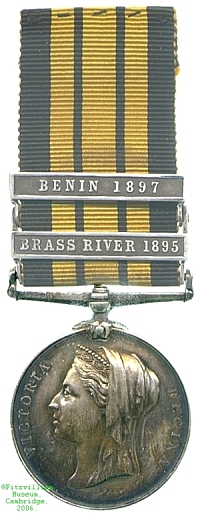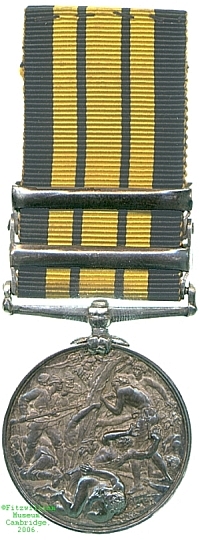
Obverse, a bust of Queen Victoria with crown and veil

Reverse, a scene of bush fighting around a tree with a fallen African to the fore

Obverse, a bust of Queen Victoria with crown and veil |

Reverse, a scene of bush fighting around a tree with a fallen African to the fore |
Peace-keeping operations in the British possessions in Africa, as anywhere else, required a large number of small campaigns, several of which, from 1892 until 1900, were considered to merit this medal, which in terms of design is a continuation of the Ashantee War Medal. Recipients who held that medal already were therefore awarded only extra clasps.
The Brass River, or Benue River as it is now known, is a tributary of the Niger River, and in the 1890s the tribes local to it, whose ruler King Koko had his capital at Nimbe in modern Nigeria, were increasingly concerned about European inroads into the palm-oil trade, which threatened their livelihoods. In January 1895 the Royal Niger Company's station at Akassa was attacked and more than forty people killed. Reprisal was carried out by four ships of the Royal Navy within a month and Nimbe partially destroyed. For this expedition the Brass River bar was awarded. The Benin 1897 bar was given for involvement in the 1897 conquest of the previously independent Kingdom of Benin, which had existed since the 14th century. This campaign was occasioned by the slaying of eight British representatives there in 1896, in a time of increasing tension over the palm-oil trade, which Benin protected fiercely. The resultant Punitive Expedition captured and looted Benin City, which is now in Nigeria. The bar was awarded to personnel of the Navy not for this attack, however, but for the capture of the seaboard towns of Gwato (Ughoton) and Sapobo.
This medal was awarded to Able Bodied Seaman S. G. Monk, who served in both these campaigns aboard the 3rd-class cruiser HMS Barossa. Lester Watson purchased the medal at some point from the London dealer Spink before 1928.